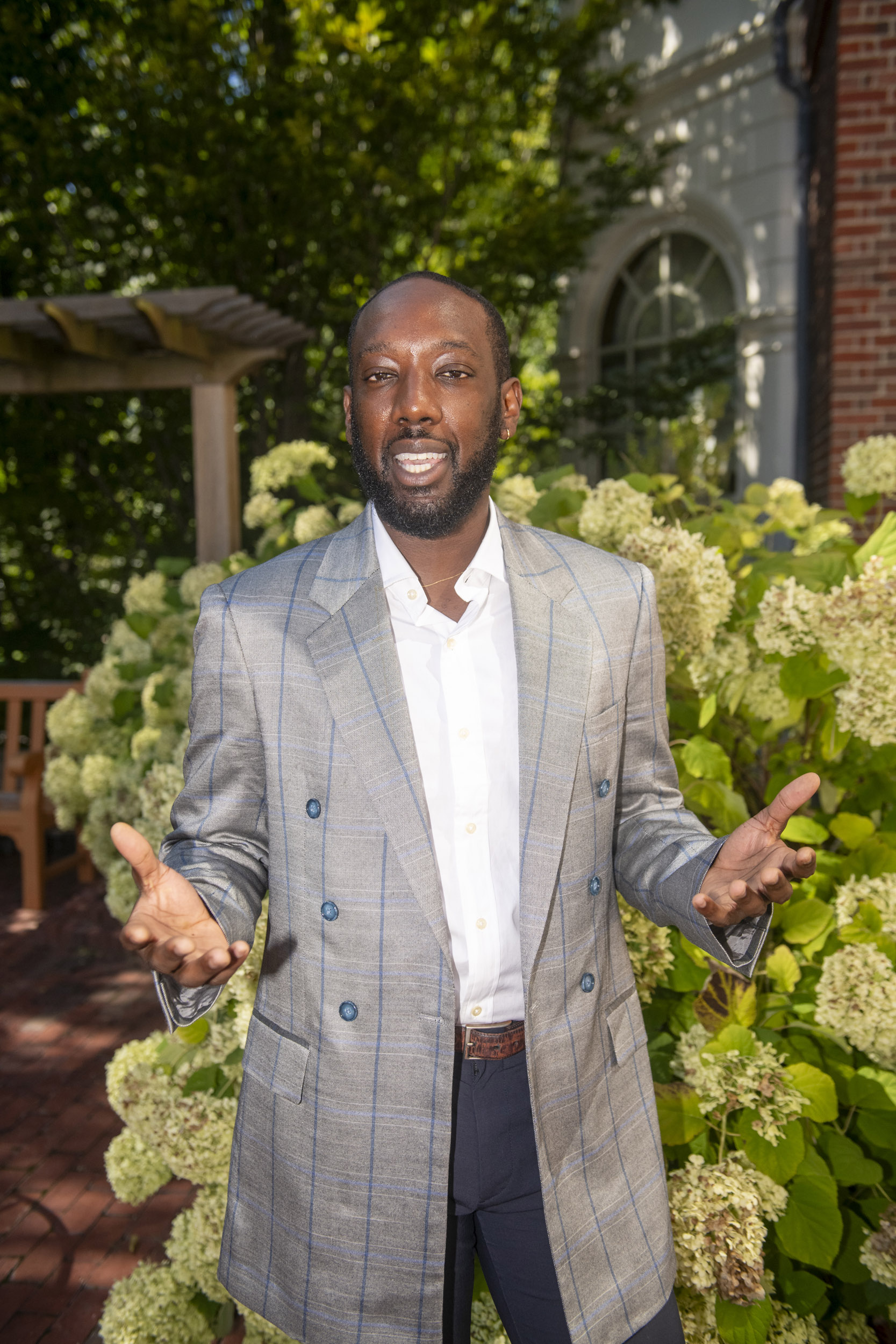‘Sharing scholarship in many different registers’
George Aumoithe rings the bell teaching history, exploring electronic music

“Two things that seem unrelated can actually generate all sorts of novel connections,” says Assistant Professor George Aumoithe.
Jon Chase/Harvard Staff Photographer
Sometimes people think they should have “one professional identity and one thing you do for fun,” said George Aumoithe. “But I look at both sides as different modes of expression — and I want to practice sharing scholarship in many different registers.”
Aumoithe is able to do just that. With dual appointments in the History Department and Department of African and African American Studies, he begins the day teaching “Healthcare and the Welfare State.” In the evening, the assistant professor conducts a seminar on “how Black electronic musicians responded to urban history’s unfolding.”
Aumoithe, who joined the faculty last year, said he finds it particularly interesting to study topics like health inequity, medical racism, and music in a “solidly resourced institution” like Harvard. “It’s this world-class university,” he said. “You have this golden ticket to shape and highlight the leading edge of thinking across fields such as Black studies and U.S. history.”
As an undergraduate at Bowdoin College, Aumoithe, a Haitian American, pursued a double major in history and African American Studies.
“Public health policy has become the site where we interrogate healthcare’s place in the welfare state,” he explained, noting that healthcare, public health, and welfare are distinct entities in the U.S., while they’re more interconnected in other countries.
These concerns followed Aumoithe to Columbia University, where he earned a doctorate in history under the mentorship of pioneering welfare state studies scholar Alice Kessler-Harris. At Columbia, Aumoithe began to research the ways healthcare and public assistance became “strange bedfellows” in the 20th century U.S.
His graduate dissertation served as the impetus for his upcoming book, “Medical Scarcity: The Resegregation of Healthcare in America,” which provides a history of how the wartime-scarcity mindset became a postwar search for “efficiency” in a desegregating America. The book tells a national story of federal health planning’s transformation and hospital closures with cases in New York City, Los Angeles, New Orleans, Atlanta, and the rural South.
Amid his scholarly work, Aumoithe started creating music under the act Efemèr, which means “ephemeral” in Haitian Creole. Released during the pandemic, the debut EP “Yearning” is an electronic six-song project exploring themes of intimacy, misconnection, and nostalgia in a world struck by pandemic, socio-political turmoil, and violence.
The COVID-19 pandemic brought Aumoithe’s academic interests to the forefront as the U.S. navigated a deadly disease that strained the nation’s healthcare and social services sectors. In Aumoithe’s view, it left the country with a collective trauma.
“One of the symptoms of trauma is an amnesia that sets in to protect you from reliving what happened,” he said. “The pandemic really highlighted our collective vulnerabilities just as much as it highlighted how differentiated our exposure to risk is based on racism.”
Aumoithe would like to think the country has reached consensus on the disproportionate impacts that befell Black and Latinx communities. “I fear that in our amnesia and our forgetting that we haven’t necessarily solidified those experiences and lessons into our consciousness,” he said.
Today, students in the “Healthcare and the Welfare State” course analyze these issues and more in national and comparative contexts, including the possibility for universal healthcare amid a tendency in the U.S. to institute incremental expansions of safety net programs.
Meanwhile, the course on electronic dance music’s Black history has allowed Aumoithe to teach it through a new and exciting lens. The course will welcome five guest speakers and performers during the semester and include the public via livestreams.
“Music in popular culture in particular can sometimes be pigeonholed as just cultural history,” Aumoithe said. “Music is also a generative way to think about connections to urban history, and in the case of disco’s and house’s importance to communities suffering from HIV and AIDS, to a more fully human history of public health.”
Combining both artistic and historical scholarship is good for the brain and something Aumoithe encourages his students to explore. “Two things that seem unrelated can actually generate all sorts of novel connections,” he said. “Even if certain subjects don’t on their face connect thematically or content-wise, using our mind’s flexibility can lead to insights across research areas.”




